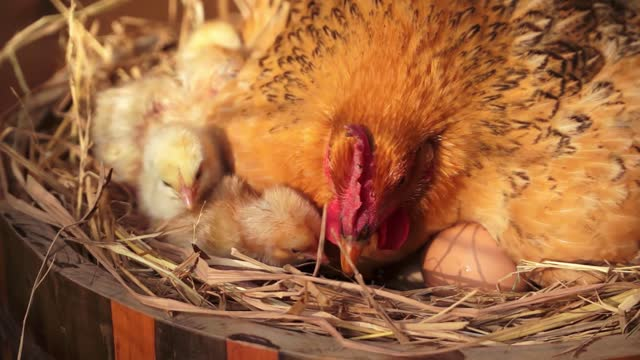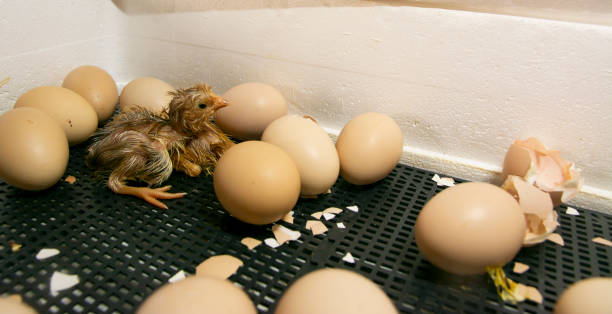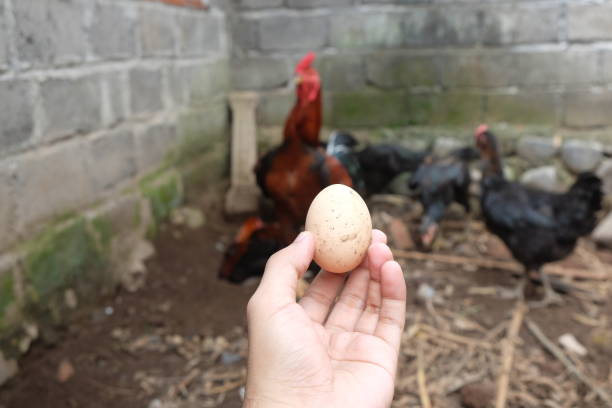Can Chicken Eggs Hatch Naturally?
In nature, wild chickens and certain breeds of domesticated chickens are known to exhibit natural brooding behavior. A broody hen is a chicken that instinctively wants to sit on and incubate a clutch of eggs. When a broody hen takes charge, nature takes over the incubation process. The hen's body heat, combined with the eggs' natural ability to retain heat, creates the necessary conditions for embryo development.
The Role of a Broody Hen

A broody hen provides several advantages when it comes to hatching eggs naturally:
- Temperature Regulation: A broody hen is naturally equipped to regulate the temperature within a nesting area. She adjusts her position, wings, and feathers to ensure the eggs receive adequate warmth.
- Humidity Control: While incubators usually require manual adjustments for humidity, a broody hen instinctively moistens her feathers and transfers moisture to the eggs through her brood patch. This helps maintain the appropriate humidity levels necessary for embryo development.
- Nest Protection: A broody hen's presence deters predators and provides security for the eggs. Her constant incubation and protective behavior significantly increase the chances of successful hatching.
Artificial Methods of Hatching without an Incubator

While natural brooding offers a captivating experience, circumstances may arise where an incubator is not available. In such cases, there are alternative methods that can be employed to hatch chicken eggs artificially:
- Using a Substituted Heat Source: In the absence of a broody hen or an incubator, substitute heat sources can be used to provide the necessary warmth. Heat lamps, heated pads, or even natural sunlight can be utilized to create a warm environment for the eggs.
- Warm Environment Setup:Creating a warm environment is crucial for successful artificial hatching. A small, enclosed space with good insulation, such as a box or a dedicated space in a room, can be used. The area should maintain a steady temperature between 99°F to 101°F (37°C to 38°C) throughout the incubation period.
- Temperature and Humidity Monitoring: It is important to closely monitor the temperature and humidity levels in the makeshift environment. Use a reliable thermometer and hygrometer to ensure optimal conditions. Adjustments may be required depending on the specific needs of the eggs and the breed being incubated.
- Egg Positioning and Rotation: Mimicking the natural process as closely as possible, gently rotate the eggs several times a day to prevent the embryos from sticking to the inner shell membranes. This helps promote proper development and prevent deformities.
Challenges and Considerations
Hatching chicken eggs without an incubator, whether through natural brooding or artificial means, comes with its own set of challenges and considerations:
- Consistency: Maintaining a consistent temperature and humidity can be more challenging without the precision control of an incubator. Regular monitoring and adjustments are necessary to ensure optimum conditions for the developing embryos.
- Predation and Safety: Incubating eggs without the protective presence of a broody hen may make eggs more vulnerable to predators. Taking necessary precautions such as providing a secure enclosure or supervised nesting space can help mitigate this risk.
- Success Rates: Natural brooding and artificial methods may have lower success rates compared to using an incubator. The controlled environment of an incubator offers greater control over temperature, humidity, and other factors crucial for successful hatching.
- Time and Patience: Hatching without an incubator requires a longer investment of time and patience. The process may take longer, and the successful hatching of each egg cannot be guaranteed.
Summary
While an incubator provides a controlled and reliable environment for hatching chicken eggs, nature has its mechanisms in place for egg incubation and hatching. Through the brooding behavior of hens and the ingenuity of alternative methods, it is possible to hatch chicken eggs without an incubator. However, it is important to remember that natural and artificial methods may have varying success rates and require careful monitoring and adjustments.

Whether you choose to embrace nature's way or opt for alternative methods, the journey of hatching chicken eggs is a marvel to behold. So, embrace the wonder of life and explore the possibilities of hatching chicken eggs, whether within the comfort of an incubator or through the amazing adaptations nature has provided. Happy hatching!



Leave a comment
All comments are moderated before being published.
This site is protected by hCaptcha and the hCaptcha Privacy Policy and Terms of Service apply.